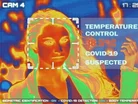Could thermal scanners end the COVID-19 lockdown?

Companies are increasingly turning to thermal cameras to detect signs of coronavirus in their employees and customers. After a lengthy period of lockdown businesses are eager to reopen, and avoid further losses due to staff sickness and closure.
The scanners use infrared technology to measure temperature, which are generally accurate to within half a degree. The hands-free devices also use advanced facial recognition technology to identify people with fevers. Those with high temperatures can then be sent home to prevent infection from spreading to other members of staff and customers.
This presents a possible way for businesses to get back to work while COVID-19 remains active among the population. Downtime caused by employee sickness could be prevented, whether due to COVID-19 or any other infectious disease. Workplaces that need to remain open, such as hospitals, schools, shops, restaurants and dentists, could particularly benefit.
Thermal scanners are used at airports around the world, as well as on public transport, in restaurants, bars and beauty salons. However there is evidence that most people are infected with coronavirus for five days or more before displaying symptoms. Studies show that over 40 per cent of cases don’t display symptoms - but can still pass on the disease.
Additionally COVID-19 is not the only type of infection or condition that causes a fever. A woman’s monthly cycle for example, can also cause a high temperature and lead to a false result. Researchers estimate that out of every 100 infected people only 9 will be detected with temperature screening.
Thermal cameras were originally created for military use in the early 20th century. Later they became frequently used by firefighters to find people through smoke and fire. They are not medical devices, therefore can’t measure body temperature in the way thermometers can, but measure skin temperature instead.
The World Health Organization (WHO) concluded that temperature screening alone may not be very effective at detecting coronavirus. It can however be useful in combination with other tools. Thermal scanning could be the first in a number of screening tests, followed by a questionnaire or a test.
Earlier this year WHO published a list of screening recommendations for travellers, most of which apply in any setting. These are:
- Questionnaires for people to fill out with details of any symptoms, history of exposure and contact information.
- Trained staff who are available to help with early detection and evaluation of cases, equipped with the relevant medical supplies
- Signs with clear information on where medical attention can be accessed
- Thorough disinfection of areas used by customers and staff after usage
- Hand sanitizer available throughout the establishment
- Refusing entry to anyone suspected of carrying the disease
- Gates Foundation & South Korea to embolden healthcare sectorTelehealth & COVID-19
- Polio in 2022: the virus is back in the post-COVID-19 eraTelehealth & COVID-19
- Digitalisation and supply chains: the NHS post-COVID-19Hospitals
- Australian healthcare workers COVID-19 appreciation paymentHospitals



